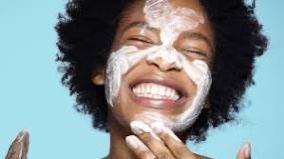
For years Black people have navigated the world with the notion that because we have melanin, we do not need sunscreen, when in fact our skin is just as susceptible to sun damage as others are.
The idea that our skin can sustain itself under harsh ultraviolet waves have persisted for years, causing Black people to be more exposed to damage than ever. This concept has been fueled by the phrases such as “Black don’t crack … Black don’t burn” and ,of course — racism .
Yes, there is an argument to be made that most Black people do not experience the effects of a sunburn. However, there is still a great risk. Alongside this, long-term sun exposure still leaves an opportunity to a broad range of skin-related illnesses to all skin tones such as skin cancer and melanoma.
According to the Centers for Disease Control and Prevention, “The sun’s ultraviolet [UV] rays can damage your skin in as little as 15 minutes.”
For years there have been racial biases in all components of healthcare such as child delivery, pain tolerance and skin care.
According to Healthline.com, Dr. Chesahna Kindred, vice chair of the National Medical Association dermatology section, has expressed the difference in attention given to Black skin in dermatology.
“[A lot of the] funding and awareness [for research on the effect of the sun] typically excludes those with darker skin tones,” Kindred wrote.

Years of mistreatment to racial minorities have been ingrained into our society, to a point where physicians do not realize that their behaviors may be racially charged under a notion called implicit bias. This is an unconscious bias to minorities that they are unaware of.
This bias has breached areas involving not only our physical health but our cosmetic spaces relating to Black people’s skin. Black people have been left as a second thought by the beauty community with a lack of cosmetic options for people with darker skin tones.
Most American produced physical sunscreens contain either zinc oxide or titanium dioxide, which are ingredients that provide full broad-spectrum protections. However, these ingredients are often formulated in a way that excludes people with darker skin tones. Most sunscreen products leave a white cast on the surface of your skin making it difficult for darker skin toned people to apply to their faces for daily use.
This growing problem has led to the creation of Black-owned skin care companies such as Black Girl Sunscreen founded by Shontay Lundy.
Lundy told Rollingout.com why she was inspired to create Black Girl Sunscreen.
“I created Black Girl Sunscreen because I was underwhelmed by the options for skin protection for women of color. As a woman with a darker complexion, healthy skin has always been a priority for me. I knew that there had to be a solution to the lack of options. With this motivation, I began my journey to find a solution for eliminating white residue and making women of color feel great and look great in the sun,” Lundy said.